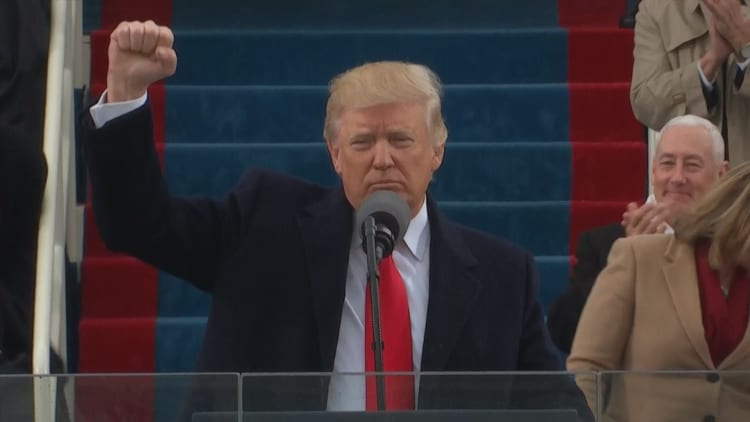
President Donald J. Trump preached his populist and nationalist gospel in his first speech as the nation's 45th chief of state, pledging an "America first" creed.
"The forgotten men and women of this country will be forgotten no longer," the businessman and former reality television star said in front of the U.S. Capitol on Friday.
As raindrops fell on the crowd gathered on the National Mall, Trump said he planned to "transfer power from Washington, D.C." to the people, taking swipes at longtime politicians, some of whom stood just over his shoulder. He told Americans that "you will never be ignored again," repeating his campaign pledges to push companies to return jobs to the U.S. and to rebuild American infrastructure.
"We must protect our borders from the ravages of other countries making our products, stealing our companies, and destroying our jobs," Trump said. "Protection will lead to great prosperity and strength. I will fight for you with every breath in my body and I will never ever let you down."
Just before his address, Trump, 70, took the oath of office from Supreme Court Chief Justice John Roberts, capping a dizzying, chaotic rise to the White House. Wearing a red tie and speaking slowly with his left hand on two Bibles, Trump pledged to "preserve, protect and defend the Constitution of the United States."
He becomes the first U.S. president with no prior government or military experience.
Trump faces a tough task in uniting Americans during his tenure. He is the most unpopular incoming president in recent memory, as only 38 percent of Americans view him positively and 48 percent view him negatively, according to NBC/Wall Street Journal polling.
Dozens of Democratic lawmakers skipped Trump's inauguration, with some citing Trump's divisive policies and comments about women and minorities. Others cited the intelligence community's conclusion that Russia interfered in the 2016 election.
The crowd gathered for Trump's inauguration filled out only parts of the National Mall, smaller than the overflowing audience seen at Barack Obama's first inauguration in 2009. Mostly peaceful protests took place in Washington before and after Trump's address, though at least 95 people were arrested.
Trump was sworn in using two Bibles, the Bible that Abraham Lincoln used at his first inauguration and his own. Trump's mother gave him his personal Bible shortly before his ninth birthday, according to the inaugural committee.
Before the ceremony, Trump greeted his own family and Barack and Michelle Obama. He did not acknowledge the former presidents who stood behind him to his left until his speech, and did not greet former opponent Hillary Clinton at all.
Associate Justice Clarence Thomas swore in Vice President Mike Pence before Trump was sworn in.
Since he launched his unlikely presidential campaign in 2015, Trump has trampled on political norms, slamming politicians and not hesitating to offend pockets of the American population. His plans related to undocumented immigrants and Muslims, among others, have left some fearful of his presidency.
He attempted to assuage some of those fears.
"Whether we are black or brown or white we all bleed the same red blood of patriots," Trump said. "We all salute the same great American flag."
Throughout the speech, Trump returned to the nationalist themes of his campaign. He touted goals to make goods in the U.S. and hire American workers, and to make "every decision on trade, on taxes, on immigration, on foreign affairs" with American workers in mind.
"At the bedrock of our politics will be a total allegiance to the United States of America, and through our loyalty to our country we will rediscover our loyalty to each other," Trump said.
Many critics have questioned whether Trump will truly hold up his populist pledges in the White House, due to his decision not to divest his global businesses and his tax plan that would significantly reduce the burden on the wealthy, among other policies.


